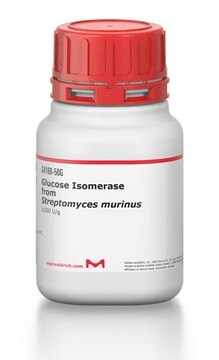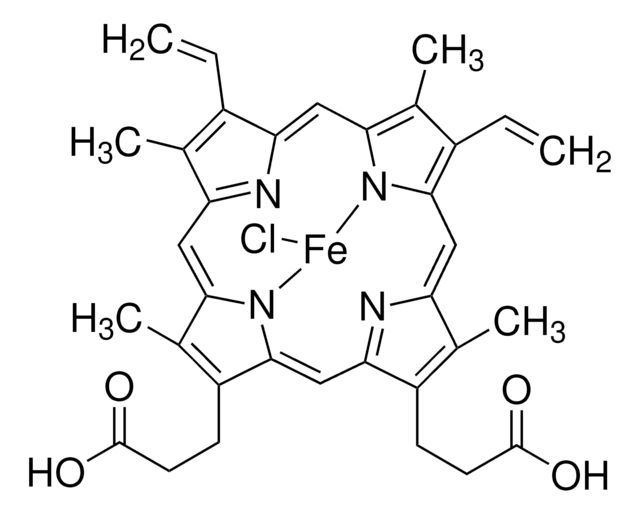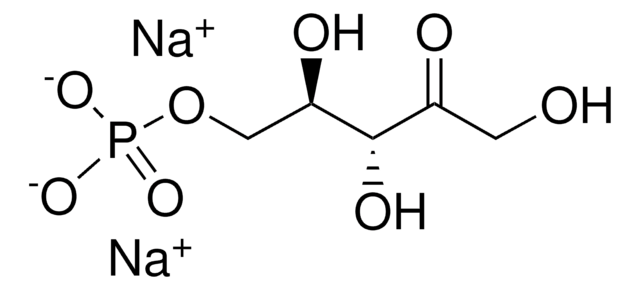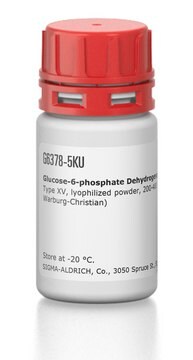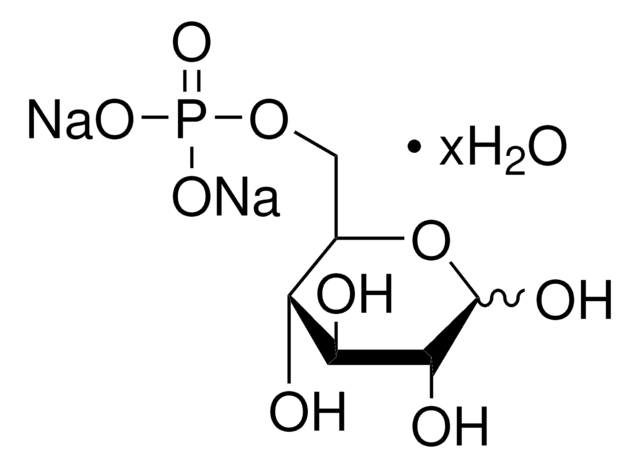SAE0005
Glucose-6-phosphate Isomerase human
recombinant, expressed in E. coli
Sinônimo(s):
GPI, PGI
Faça loginpara ver os preços organizacionais e de contrato
About This Item
Produtos recomendados
recombinante
expressed in E. coli
Nível de qualidade
Ensaio
≥95% (SDS-PAGE)
atividade específica
≥200 units/mg protein
temperatura de armazenamento
−20°C
Ações bioquímicas/fisiológicas
Glucose-6-phosphate isomerase (GPI) is a homodimeric enzyme ubiquitously present in most organisms. GPI catalyzes the interconversion between glucose-6-phosphate and fructose-6-hosphate, the second step of the glycolytic pathway. In mammals, Glucose-6-phosphate isomerase also acts as an autocrine motility factor (AMF), a neuroleukin, and a maturation factor. GPI deficiency is the second most common erythroenzymopathy of glycolytic enzymes after pyruvate kinase deficiency. Inherited deficiency of the enzymatic activity of GPI causes hereditary nonspherocytic hemolytic anemia (HNSHA) in humans, a severe deficiency that can be associated with hydrops fetalis (a-thalassaemia), immediate neonatal death, and neurological impairment.
propriedades físicas
C-terminal histidine-tagged
Definição da unidade
One unit will convert 1.0 mmole of D-fructose 6-phosphate to D-glucose 6-phosphate per inute at pH 7.4 at 25 °C.
forma física
Supplied as a solution in 50 mM Tris-HCl pH 7.5, and 50% glycerol
Código de classe de armazenamento
10 - Combustible liquids
Classe de risco de água (WGK)
WGK 1
Ponto de fulgor (°F)
Not applicable
Ponto de fulgor (°C)
Not applicable
Certificados de análise (COA)
Busque Certificados de análise (COA) digitando o Número do Lote do produto. Os números de lote e remessa podem ser encontrados no rótulo de um produto após a palavra “Lot” ou “Batch”.
Já possui este produto?
Encontre a documentação dos produtos que você adquiriu recentemente na biblioteca de documentos.
Miao Xu et al.
Blood, 132(6), 622-634 (2018-05-26)
Thrombopoietin (TPO), a hematopoietic growth factor produced predominantly by the liver, is essential for thrombopoiesis. Prevailing theory posits that circulating TPO levels are maintained through its clearance by platelets and megakaryocytes via surface c-Mpl receptor internalization. Interestingly, we found a
Jose Maria Bastida et al.
Thrombosis and haemostasis, 117(1), 66-74 (2016-10-14)
Currently, molecular diagnosis of haemophilia A and B (HA and HB) highlights the excess risk-inhibitor development associated with specific mutations, and enables carrier testing of female relatives and prenatal or preimplantation genetic diagnosis. Molecular testing for HA also helps distinguish
Alice Fabarius et al.
Cancers, 14(12) (2022-06-25)
Soluble factors released from irradiated human mesenchymal stromal cells (MSC) may induce genetic instability in human CD34+ cells, potentially mediating hematologic disorders. Recently, we identified four key proteins in the secretome of X-ray-irradiated MSC, among them three endoplasmic reticulum proteins
Lee-Chun Su et al.
ACS nano, 8(10), 10826-10836 (2014-09-16)
The endothelium monolayer lining in the luminal side of blood vessels provides critical antithrombotic functions. Damage to these cells will expose a highly thrombogenic subendothelium, which leads to pathological vascular changes. Using combined tissue engineering and ligand-receptor targeting strategy, we
Yunmei Wang et al.
Nature communications, 8, 15559-15559 (2017-05-31)
Inflammation and thrombosis occur together in many diseases. The leukocyte integrin Mac-1 (also known as integrin α
Nossa equipe de cientistas tem experiência em todas as áreas de pesquisa, incluindo Life Sciences, ciência de materiais, síntese química, cromatografia, química analítica e muitas outras.
Entre em contato com a assistência técnica